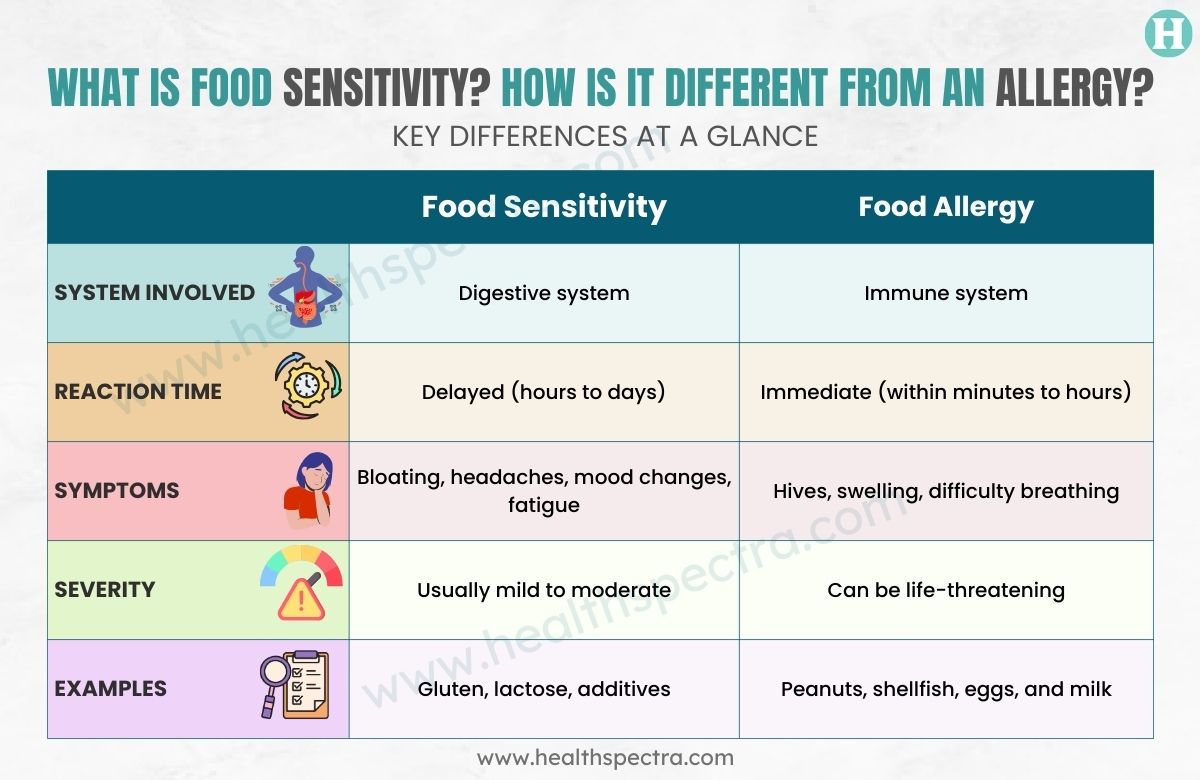Lately, there’s been a noticeable rise in childhood hyperactivity and ADHD diagnoses, leaving many parents confused about their child’s behavioural problems. While genetics and environment are well-known factors, there’s another piece of the puzzle that many overlook—the child’s diet.
Could certain foods be quietly contributing to mood swings, restlessness, or trouble focusing? Surprisingly, yes. Emerging research suggests that food sensitivities may play a significant role in behavioral challenges, and making a few dietary changes could result in significant improvements in how your child feels and functions.
In this article, we’ll break down what food sensitivities are and how they differ from allergies, explore the connection between food and hyperactivity, and identify some of the common food triggers that might affect your child.
We’ll also dive into natural, nutrition-based ways to support your child’s focus and calmness—and guide you on when it might be time to get professional support.
What Is Food Sensitivity? How Is It Different from an Allergy?

When kids start showing signs of hyperactivity, mood swings, or trouble focusing, food might not seem like the obvious cause, but it could be playing a bigger role than you think.
The challenge is that reactions to what children eat can take several forms: sensitivities, allergies, and intolerances. These are often confused, but each affects the body differently.
Here’s how to tell them apart:
Food Sensitivity (also called Food Intolerance)
- What it is: A delayed reaction to certain foods, usually caused by the body struggling to digest them properly, often due to missing enzymes or chemical imbalances.
- How it works: It’s a digestive issue, not an immune response. Symptoms usually appear several hours or even a day or two after eating the food.
- Severity: Not life-threatening. Many people can still tolerate small amounts of the food without major issues.
Food Allergy
- What it is: A reaction where the body’s immune system overreacts to a food, treating it like a harmful invader.
- How it works: The immune system releases chemicals like histamine, triggering fast and sometimes severe symptoms, often right after eating the food.
- Severity: Can be very serious—even fatal. People with food allergies must avoid the food entirely and often carry an EpiPen for emergencies.
Key Differences at a Glance

Read More: Understanding and Managing Food Intolerances in Children
Why This Matters for Your Child
Food sensitivities are sneaky. Because symptoms take longer to appear, it’s easy to miss the connection between what your child eats and how they behave later. That crankiness, hyperactivity, or inability to focus might be your child reacting to something they ate yesterday.
Understanding these differences helps you determine whether diet might be behind your child’s behavioral challenges.
The Link Between Food Sensitivities and Hyperactivity

If you’ve ever noticed your child becoming unusually restless, moody, or unfocused after certain meals or snacks, you’re not alone. Many parents report behavioral shifts in their kids that seem to line up with what’s on their plate.
While genetics and environmental factors play a role in conditions like ADHD, there’s growing curiosity around the connection between food sensitivities and hyperactivity. Though research is still ongoing, some findings are too interesting to ignore.
Here’s how food might be affecting your child’s brain and behavior:
Gut-Brain Connection
- The gut and brain are more connected than you might think. Your child’s gut contains trillions of bacteria that help regulate neurotransmitters like dopamine and serotonin—the very chemicals that control mood, energy, and focus.
- When a food sensitivity causes gut inflammation, it can disrupt this balance. The result? Increased hyperactivity, emotional outbursts, trouble sleeping, and difficulty concentrating.
Blood Sugar Spikes and Crashes
- Foods high in refined sugar, white flour, and artificial additives raise blood sugar levels, which then quickly crash.
- These quick highs and lows can make children feel wired and jittery, then suddenly irritable, tired, or spaced out—creating a rollercoaster of behavior that can mimic or worsen ADHD symptoms.
Immune Response and Brain Inflammation
- Food sensitivities can activate the immune system, leading to low-grade inflammation throughout the body, including the brain.
- This type of inflammation has been linked to symptoms like irritability, brain fog, restlessness, and even mood instability—symptoms often associated with ADHD.
What Does the Science Say?

While the idea of food sensitivities playing a role in ADHD or hyperactivity is gaining traction, it’s important to know that the science is still emerging. Researchers suggest that food sensitivities may increase hyperactivity, impulsivity, and poor concentration.
Foods that are often associated with behavioral symptoms include milk, wheat, soy, eggs, chocolate, corn, tomatoes, beans, grapes, and oranges. Some children may react negatively to synthetic dyes, which have been loosely linked to hyperactivity.
However, the evidence is mixed, and not all children are affected in the same way.
A few studies have tested this elimination-style diet (removing common allergens and additives), and some showed a noticeable improvement in ADHD symptoms. But again, this isn’t a universal fix—it varies from child to child. While there’s growing interest in this area, large-scale, conclusive studies are still lacking.
The current research shows potential correlations but not solid proof of causation. Scientists continue to explore how food sensitivities may influence brain function and behavior, especially through mechanisms like gut health, neurotransmitter imbalance, and immune responses.
Common Food Sensitivities Linked to Hyperactivity

While food isn’t the sole cause of hyperactivity, certain sensitivities might be playing a bigger role in your child’s behavior than you think. From processed snacks to some fruits and veggies, many everyday foods have been linked to mood swings, focus issues, and bursts of restlessness, especially in more sensitive kids.
Let’s break down the usual suspects and how they might be affecting your child:
1. Artificial Additives and Preservatives
Packaged and processed foods often come loaded with additives, many of which can stir up hyperactivity, especially in sensitive children.
- Food dyes like Red 40, Yellow 5, and Blue 1 have been shown in some studies to increase impulsivity and restlessness.
- MSG, high-fructose corn syrup, and sodium benzoate are linked to mood swings, poor focus, and irritability.
- Additives like tartrazine (E102) and allura red (E129) are also under scrutiny for their potential behavioral effects.
2. Dairy Sensitivities (Casein and Lactose)
Some kids have trouble digesting dairy, particularly the casein protein or lactose sugar. This can lead to gut inflammation, which, in turn, messes with neurotransmitters like dopamine and serotonin.
This results in hyperactivity, mood swings, tummy troubles, and even sleep issues.
3. Gluten and Wheat
You don’t need to have celiac disease to be sensitive to gluten. Even without a formal diagnosis, some kids react poorly to wheat, barley, or rye, with symptoms like brain fog, irritability, and even aggression.
Some research has even shown that going gluten-free helped children focus better and reduced hyperactivity in those who were sensitive.
4. Sugar and Refined Carbs
Sugar itself isn’t evil, but the refined, hidden kinds can wreak havoc on young brains and energy levels. It often causes quick blood sugar spikes followed by crashes, leading to a cycle of hyperactivity, fatigue, and irritability.
Sticking to whole, unprocessed foods can help keep energy levels more stable.
5. Salicylates (Surprisingly Found in Healthy Foods!)
These naturally occurring compounds, found in some fruits and vegetables like kiwi, grapes, peaches, zucchini, broccoli, and tomatoes, can still trigger sensitive kids.
For some children, these healthy foods may lead to hyperactivity, irritability, or even skin issues.
6. Soy, Eggs, Corn, Peanuts, Shellfish, and Nuts
These are common allergens that may also act as hidden triggers, especially when they sneak into processed or packaged foods.
They can contribute to inflammation, mood shifts, and digestive disturbances that may influence behavior.
How Do These Foods Affect Behavior?

So, we’ve looked at which foods might be causing trouble, but how exactly do they impact your child’s behavior?
- Inflammation: Food sensitivities can lead to inflammation that impacts brain function, causing symptoms like brain fog, restlessness, or irritability.
- Neurotransmitter Disruption: The gut is directly tied to neurotransmitter production, and certain foods may throw this off balance.
- Allergic-like Reactions: Even without full-blown allergies, sensitivities can still create immune responses that affect attention and mood.
How to Identify if Food Sensitivities Are Affecting Your Child

If you suspect that your child’s behavior, mood swings, or hyperactivity might be connected to what they’re eating, you’re not alone — and you’re not imagining it. Identifying food sensitivities can feel like solving a mystery, but with some patience and a bit of detective work, you can start to connect the dots.
- Keep a Food Diary: Start by tracking what your child eats, when they eat it, and how they feel or behave afterward. Do they become unusually hyper, irritable, or foggy after certain meals or snacks? Writing these patterns down in a food-mood-energy log can be surprisingly insightful and can help you notice reactions that might otherwise fly under the radar.
- Try an Elimination Diet: An elimination diet is one of the most effective tools for pinpointing food sensitivities. The idea is simple: Remove common trigger foods (like dairy, gluten, soy, artificial additives, etc.) from your child’s diet for 2 to 4 weeks. Then, reintroduce each food one at a time while watching for changes in behavior, energy, mood, or digestion.
- Testing Options: While food sensitivity testing (like IgG antibody tests) remains controversial and not always medically recommended, some parents find them useful as a starting point. Another option is gut microbiome testing, which can offer a broader look at your child’s digestive health and how well their gut is functioning — a key piece in the gut-brain puzzle.
Read More: Best At-Home Food Sensitivity Test Kits to Identify Hidden Intolerances
What to Do Next
- Talk to a doctor or registered dietitian if you suspect food is impacting your child’s behavior. They can help guide you through elimination diets, recommend reliable testing, and rule out any serious allergies.
- Food allergy testing (such as skin prick tests or specific IgE blood tests) may also be recommended if an actual allergy, not just sensitivity, is suspected.
- Stay prepared for severe reactions. If your child ever experiences symptoms like throat swelling, trouble breathing, or hives, treat it as a medical emergency and seek help immediately.
How to Boost Focus and Calm Through Diet

A balanced, nourishing diet can do wonders for supporting brain health, emotional regulation, and overall well-being.
Anti-Inflammatory Foods
Reducing inflammation in the body can have a positive impact on brain function and behavior. Including anti-inflammatory foods in your child’s meals can help support focus and reduce hyperactivity. Try incorporating:
- Omega-3-rich foods like wild-caught salmon, walnuts, chia seeds, and flaxseeds — known to support cognitive health and mood regulation.
- Probiotic-rich foods such as dairy-free yogurt, sauerkraut, and kefir, which help support gut health — an often-overlooked factor in mood and focus.
Blood Sugar Stabilization
Blood sugar spikes and crashes can lead to mood swings, energy dips, and lack of focus. To keep things steady:
- Build meals around lean proteins (like chicken, tofu, or beans), healthy fats (like avocado, olive oil, or nuts), and fiber-rich carbohydrates (like oats, sweet potatoes, and whole grains).
- Ditch the ultra-processed snacks. Instead, go for whole food options like fruit, veggie sticks with hummus, trail mix, or boiled eggs — these keep energy levels more stable and reduce those crash-and-burn moments.
Brain-Boosting Vitamins and Minerals
Certain nutrients are key players in helping the brain function at its best:
- Magnesium helps with relaxation, sleep, and staying focused.
- Zinc and iron are often found to be low in kids with ADHD symptoms, and their presence supports attention and emotional regulation.
- Vitamin D is essential for mood and immunity, while B-complex vitamins help with energy, brain function, and reducing stress.
Hydration and Sleep: The Unsung Heroes
Sometimes, the basics make the biggest difference:
- Dehydration — even if mild — can mimic or worsen symptoms of hyperactivity and poor focus. Make sure your child drinks water consistently throughout the day.
- A consistent sleep schedule is crucial. Encourage a calming bedtime routine without screens at least 30–60 minutes before sleep. A well-rested brain is a better-regulated brain.
A nourishing diet won’t replace professional treatment if needed, but it can complement other interventions and support your child’s overall health. It’s about progress, not perfection — small changes can lead to big improvements over time.
Read More: The Anti-Anxiety Diet: What to Eat (and Avoid) for a Calmer Mind
When to Seek Professional Help

While dietary changes can make a big difference for some children, they might not be the whole solution. If you’ve tried adjusting your child’s meals and still notice persistent symptoms of hyperactivity, it’s a good idea to consult a healthcare professional.
A pediatrician, registered dietitian, or integrative health expert can help dig a little deeper. They can check for:
- Nutrient deficiencies that might be affecting your child’s focus or mood.
- Food sensitivities or intolerances that aren’t immediately obvious.
- Other underlying health issues that may be contributing to behavioral symptoms.
Getting professional guidance not only provides peace of mind but also ensures that your child receives well-rounded support tailored specifically to their needs.
Important Things to Keep in Mind

Before drawing conclusions or making major dietary changes, it’s essential to approach the food-behavior connection with a balanced mindset. Every child is unique, and what works for one may not work for another. That’s why considering a few key factors can make all the difference in how you understand and respond to your child’s needs.
- Every Child is Different: What triggers hyperactivity in one child might not affect another at all. That’s why it’s so important to avoid jumping to conclusions based on general trends.
- Elimination Diets can Help: If you suspect certain foods may be contributing to your child’s behavioral issues, speak to a doctor or dietitian before cutting out major food groups. A guided elimination diet can be helpful to pinpoint triggers.
- Don’t Overlook the Gut: Since gut health affects brain health, maintaining a balanced diet that supports the gut microbiome might have positive effects on mood and focus, too.
- Take a Holistic Approach: Dietary changes might be just one piece of the puzzle. A well-rounded approach to managing hyperactivity or ADHD symptoms often includes a mix of nutrition, behavioral therapies, lifestyle shifts, and in some cases, medication.
While the food-hyperactivity link isn’t very clear, one thing is certain: good nutrition influences behavior, especially in sensitive kids.
Conclusion
At the end of the day, figuring out if food sensitivities are playing a role in your child’s hyperactivity can make a big difference. While not every case of ADHD or hyperactive behavior is caused by food, many kids do react to things like dairy, gluten, sugar, artificial colors, or even certain fruits and veggies. It all ties back to gut health, inflammation, and how their body processes food, which can affect focus, mood, and energy.
Keeping a food diary, trying an elimination diet, or getting some tests done (with a doctor’s help, of course) can help uncover hidden triggers. At the same time, adding more brain-boosting foods — like salmon, nuts, leafy greens, and probiotics — and making sure they’re getting enough sleep and water can support focus and calm.
If nothing seems to be working, then reach out to a healthcare professional for extra help.
References
- What’s the Difference Between a Food Allergy and a Food Intolerance?
- Food Sensitivities in Attention-Deficit/Hyperactivity Disorder
- Dietary sensitivities and ADHD symptoms: thirty-five years of research
- Individual Behavioral Reactions in the Context of Food Sensitivities
- Food Sensitivities and ADHD
- 5 Foods to Avoid if Your Child Has ADHD
- Eggs, Dairy, Nuts, and Soy: Testing for Food Sensitivities with an ADHD Elimination Diet
- Food Allergy Testing
- Food for concentration: 10 foods to help you focus
In this Article





















